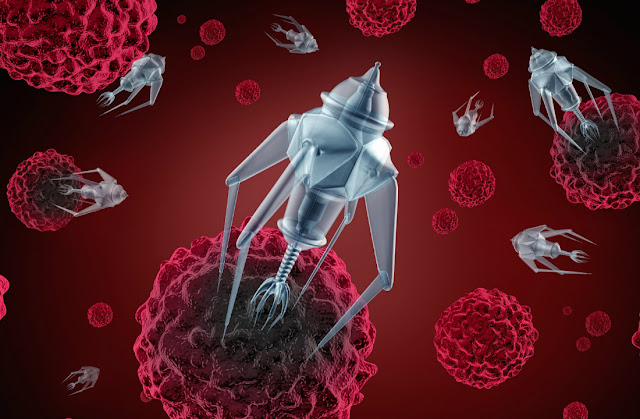Cancer Diagnosis and Treatment by Nanotechnology
Nanotechnology – Impact On Cancer Diagnosis & Treatment:
Nanotechnology has an immense potential to meet the challenging needs of ever increasing healthcare concerns with cancer at the forefront.
Nanotechnology involves manipulating structures at nanoscale is an emerging new field. A team of scientists led by chemistry professor Joseph DeSimone, University of North Carolina at Chapel Hill (U.N.C.) has shown that the shape of these nanoparticles is much more important than size in expediting the penetration of drug in target human cells. In the passive form, this technology has been successfully used in products such as cosmetics and sunscreens and has the future implications in improved electronic equipments and better batteries etc. The application of nanotechnology has a huge potential in the medicine and healthcare sectors which ultimately provides tremendous benefits to society in future.
Cancer is one of the major causes of mortality worldwide. The most common cancer treatments are limited to chemotherapy, radiation, and surgery. The current anticancer agents have certain limitations for e.g. they are distributed systemically in the body in a non specific manner; drug concentrations do not reach the tumor in an adequate amount and they are unable to monitor the therapeutic response of the drug appropriately. Nanotechnology plays a revolutionary role in combating these challenges by offering the researchers with the wealth of tools to diagnose and treat cancer. Today, cancer-related nanotechnology is moving forward in two major areas: laboratory-based diagnostics and in vivo diagnostics and therapeutics.
In September 2004, the US National Cancer Institute (NCI) launched the Alliance for Nanotechnology in Cancer in the hope that investments in this branch of nanomedicine could lead to breakthroughs in terms of detecting, diagnosing, and treating cancer. “We’ve pulled most of the key players in medical nanotechnology into this programme, and we’re spending about US$35–40 million a year on these approaches,” says Piotr Grodzinski, Director of the NCI Alliance.
An annual symposium for Integrative Cancer Research was conducted at Massachusetts Institute of Technology (MIT) on June 27, 2008 where speakers from MIT and various other institutions described the promising use of nanotechnology in diagnosing and treating cancer.
For more updates visit HarNeedi.com


Comments
Post a Comment